Spring. Many of us in the northern Midwest started to believe that mother nature deleted spring. April was cold. Dreary. And snowy. We were restless. Those of us that deal with depression and anxiety find long dreary winters to be even more difficult. I know some days it was hard to muster up the strength to get out of bed and carry on my normal routine.
Spring. Hope. When you live with the four seasons you know what to expect and you look forward to those season changes, even if you don’t like some of them, you know they are coming. When winter starts to drag on, I long for spring, for signs of black dirt in the fields and a daffodil or tulip poking through the cold ground.
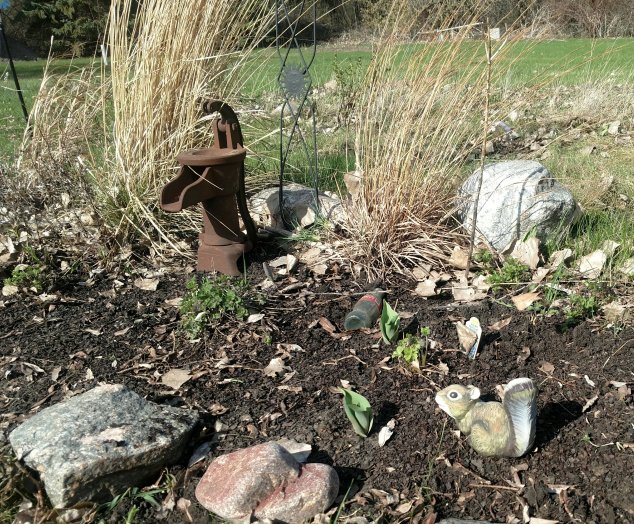
Part of my perennial flower bed poking through for another year.
Hope. A sign that winter will end and we will once again have a new beginning. We will once again have a chance at new life. The kids can play outside and I can play in my flower beds. Hope.
In my career with the Farm Service Agency I have the privilege of working with farmers and ranchers from multiple counties in meeting their financial needs with loans from our agency. Hope. For another growing season for some. For others just starting out, hope for a long term opportunity to take over the family farm from the previous generation. For some, hope that if we help refinance some debt that this year will be the turning point for them again. Spring. Hope.
Hope. The feeling of something good going to happen. A feeling of trust. A belief in the future.
Agriculture is an industry built on hope. Every year you plant a tiny seed. Then hope for rain. Hope for sun. Hope for good weather. Hope for prices high enough to pay the bills. Hope.

Rockstar checking the depth of the corn seed going in his field.
Growing up on the family farm in SD, I was a young girl during the 1980’s Ag crisis. Interest rates were at an all time high of 18-20%. Most farmers have some kind of loans for land purchases, equipment purchases, or for annual operating. (Farmers have to pay for seed, fertilizer, fuel, rent and more all year but won’t receive income until the crops are harvested in the fall. Hence why banks will lend money to farmers in the spring until they harvest in the fall). These high interest rates, extreme drought in some areas, low prices and little to no crop insurance lead to many farmers declaring bankruptcy and selling out. It was hard. It was devastating. My parents like many others were heavily in debt with the local bank as well as the Farmers Home Administration (FmHA which is now called FSA – where I work).

During this time, FmHA called my parents loans. Mom and Dad hadn’t been able to make their payments so FmHA started the foreclosure process. Mom and Dad found an accountant who understood agriculture and the financial world and started to help them out. My mom still tells the story of how they were served with papers and told to show up at a certain date and time at the courthouse. They did. Their local banker was there, the accountant and “some lady from Pierre”. My mom tells of this woman walking into the courtroom with a fancy dress and high heels on. My parents had never met her or done business with her, but she was there representing FmHA . The local banker went on to say that “these were good people” and that he wanted no part of foreclosure. Mom and Dad kept the farm. There was a very small write off and some restructuring of loan terms. In the coming years, Dad sold most of his equipment, put a lot of the land into a conservation program and started working in town. So did mom. We still had pigs and the cows and some land to farm. Dad came to despise the FmHA office and as I got older he would pass the paperwork and letters to mom or I to “see what the hell they want now.” And so I spent my teenage years learning that FmHA was bad. Not to be trusted. The home of the devil himself.
Mom and Dad eventualy paid off their debts, moved to town and really lived a pretty good life.
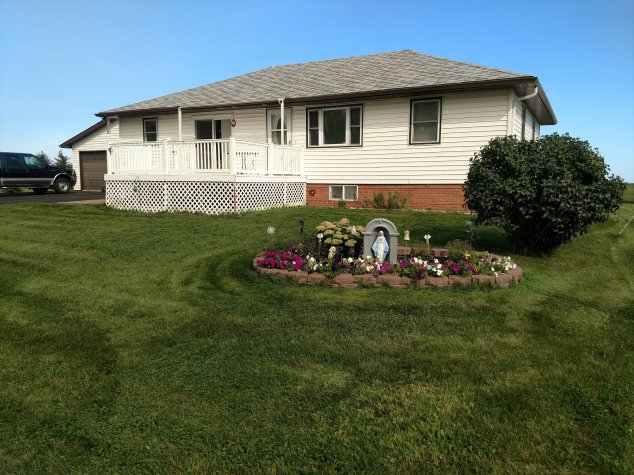
Mom and Dad’s house. Built on the farm in 1960 then moved to town in 2001.
I went off to college, met my farm boy and knew I was headed to a life in agriculture. You see I loved agriculture just not FmHA. Fast forward to 2008 and there was a job opening with the Farm Service Agency. I needed a change from the bank and this would give me a chance to work directly with farmers. I took the job. I called home and told Mom and Dad worried what they would say. Dad’s comment was why in the world would I ever choose to work there. I assured him that things had changed and that I was working with farm programs not loans. I had no intention of ever crossing that line.

Late 2016 an opportunity came along for me to become a FLOT (Farm Loan Officer Trainer). There would be upward mobility if I wanted it. It would be a challenge to learn something new again. But……how could I work there. Mom asked if I had my head on straight. I figured if Dad were alive he’d tell me I was completely crazy.
I took the job. I struggled. Seriously struggled with the fact that I did this. How could I knowingly choose to be that person that puts farmers out of business? I still occasionally see my Life coach aka therapist and in discussing this she reminded me that I was no longer that scared young teenager living at home wondering what would happen to my whole life when that next letter came from the FmHA office. I was fully in control of my life and most importantly, in control of how I treated my farmers. Whoa. Things that happen in your childhood really can affect your adult life. Game changer.
We then attend the ND Farm Bureau annual meeting and hear about how a certain county’s farm loan staff in the state was treating farmers very poorly. It made my blood boil. Then and there I vowed to always do my best to treat my farmers with the respect and kindness they deserve, even in giving bad news. Everyone deserves kindness. It is now my mission to change people’s perceptions of the Farm Service Agency, specifically the farm loan departments, one farmer at a time. I cannot change the world, but I can change a day or two in the world of each farmer I work with. It won’t be easy. But it will be worth it.
Full circle. I’ve come a long way. From the kid helping Mom and Dad, believing that “those people that worked there” were horrible and anti-farmer, to working there and trying every day to show my belief and support for all those in agriculture. Hope. For myself and hopefully I can give a little hope to my farmers as well.
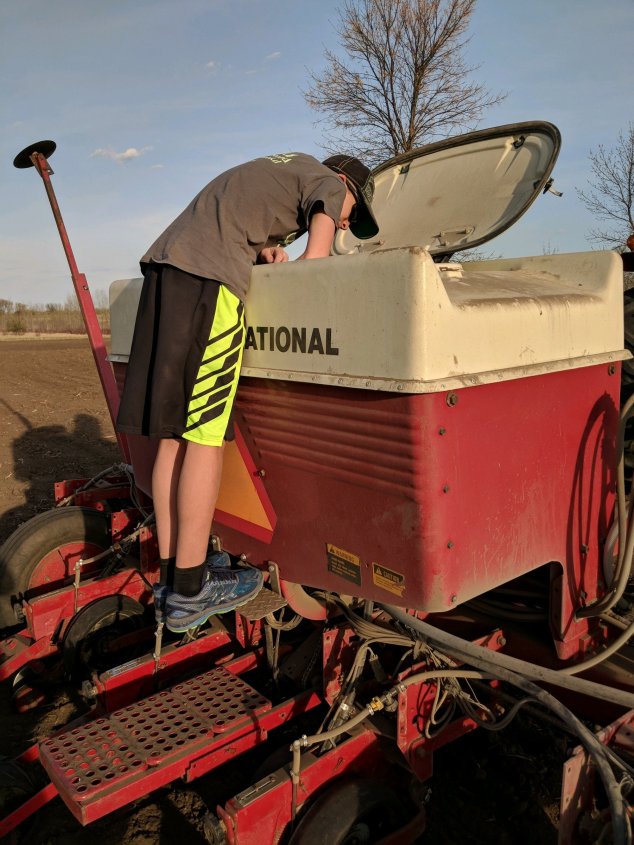
Rockstar filling the corn planter with seed for his field.
Times in agriculture are tough again. Prices that farmers pay for seed, fertilizer, fuel, land, equipment keep climbing while the price they are paid for their product is low, for some commodities like milk and dairy, so low that dairy farms are forced to quit nearly every day. Corn price is about the same as it was in the mid-1970’s. I can guarantee you that no expense is the same as 40 some years ago. I know that at some time in my career, I will be in the position of telling a farmer that he has to quit. My hope is that I will have built a relationship with them so maybe, with time, they won’t hate me but know that sometimes things don’t work. Hopefully that time doesn’t come along for a long time.
Agriculture is about generations and families. My great-great grandparents came from Russia to the USA and homesteaded in Emmons county, ND. That farm is still in the family. That is a point of pride in my family history on mom’s side. (A large family reunion was held on the homestead in 2000. Read about it here: https://library.ndsu.edu/grhc/outreach/reunion/vfvetter.html)
The third generation is now living on the farm where I grew up just down the road from the farm where my dad grew up. My parents bought the farmstead when they got married and built it from bare land to all that stands there now. My sister and her family bought and moved to the farmstead when mom and dad moved to town. Now my nephew has purchased a few acres and built a hop (house and shop all as one building. It’s cool!)

My nephew’s Hop (part house part shop).
Hope for the future. Maybe someday a fourth generation will live and farm there. Who knows!
Today, my Rockstar is in MN planting his 20 acres of corn. He is 14. The Farm Service Agency in MN gave him a $5000 operating loan. Grandpa is helping him out with equipment and guidance and more. This is a huge opportunity for him and I am proud to work for the agency that helps the next generation get started. Hope. For a good crop. Hope for the future. Hope for agriculture.
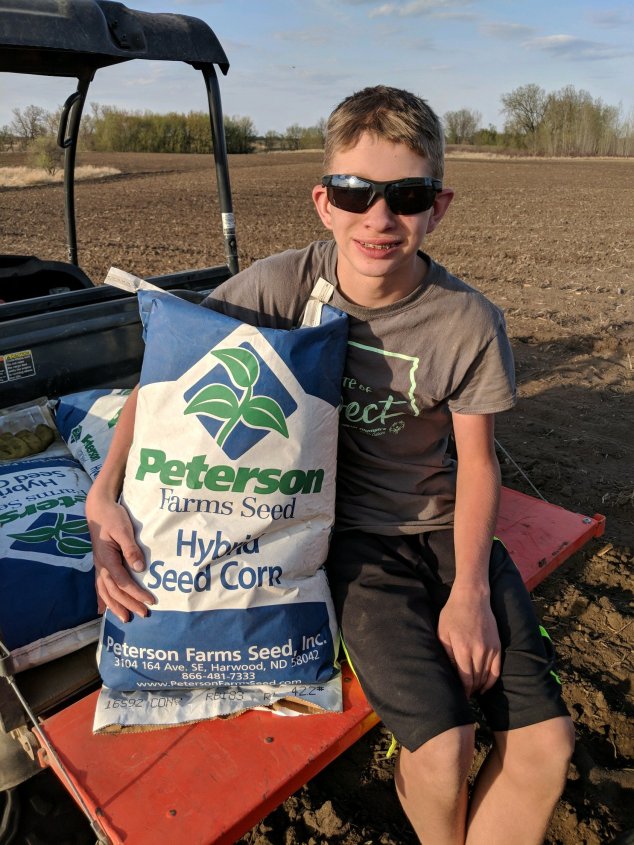
The next generation. Lots of people are pretty proud of this young man.
This spring, watch for tractors and slow moving vehicles on the road. Slow down. Pass with care. The farmers in those rigs are going to work just like you. Support farmers and agriculture. Thank them for growing the food you eat, the clothes you wear and the fuel you put in your vehicle.
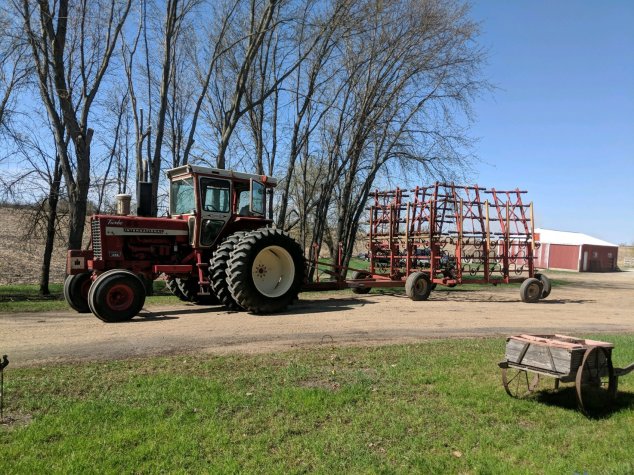
Grandpa Doug’s IH 1456 ready to go to the field to get it ready to plant.
When you see tractors, please slow down!
Till next time,
Deb
For more information on any of the Farm Service Agency programs or loans please check out https://www.farmers.gov/ or let me know and I can get you contact info for your local office where ever you may live.











